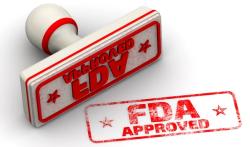© 2025 MJH Life Sciences™ , Patient Care Online – Primary Care News and Clinical Resources. All rights reserved.
FDA Approves Nirsevimab-alip Injection to Prevent RSV in Neonates, Infants
The FDA has announced the approval of nirsevimab-alip (Beyfortus; Sanofi and AstraZeneca) to prevent respiratory syncytial virus (RSV) lower respiratory tract disease (LRTD) in neonates and infants entering, or born during their first RSV season, according to a press release from the federal agency. Additionally, nirsevimab-alip is approved for children up to 24 months that remain vulnerable to severe RSV through their second season.1
Nirsevimab-alip, a monoclonal antibody that acts against RSV, is administered as a single intramuscular injection prior to or during RSV season. The FDA states that 1% to 3% of US children under 12 months are hospitalized because of RSV each year. Most infants will experience mild cold-like symptoms, but others can develop LRTDs like pneumonia and bronchiolitis, which can lead to emergency department visits. The highest risk for severe RSV targets premature infants and patients with chronic lung disease of prematurity or significant congenital heart disease.1
“I’m very pleased with this [approval],” said John Bradley, MD, medical director, Rady Children’s Hospital, San Diego, California, in an interview with Contemporary Pediatrics. “RSV creates an enormous amount of illness respiratory distress [and] difficulty breathing in babies during their first year of life. To have something to prevent that or modify it, is incredible.”
Nirsevimab-alip demonstrated safety and efficacy was measured in multiple clinical trials leading up to the FDA approval. In a phase 2 trial (NCT02878330), 1453 preterm infants (born at 29 weeks of gestation or greater up to less than 35 weeks of gestation) that were born into or entering their first RSV season were included.1 Of the total infants in the trial, 963 received a single dose of nirsevimab-alip, compared to 484 that received placebo. Results demonstrated that 25 (2.6%) nirsevimab-alip patients experienced medically attended RSV lower respiratory tract infection (MA RSV LRTI) compared to 46 (9.5%) patients who received placebo. Relative to placebo, nirsevimab-alip reduced MA RSV LRTI risk by approximately 70%.1
In the phase 3b Hospitalized RSV Monoclonal Antibody Prevention (HARMONIE; NCT05437510) study, nirsevimab-alip demonstrated an 83.21% reduction in RSV-related hospitalizations in infants under 12 months of age that received a single dose of nirsevimab-alip, compared to infants with no RSV intervention.2
“We hospitalized almost 1000 babies last year, both [healthy] babies as well as babies with underlying heart disease or lung disease who had RSV pneumonia” Bradley said. “If nirsevimab in clinical practice, meets its expectations, we should decrease the number of hospitalizations from 1000 down to 500 or even 300 or 400 per year, which is a dramatic decrease.”
In June 2023, the FDA Antimicrobial Drugs Advisory Committee (AMDAC) voted 21 to 0 that nirsevimab-alip has a favorable benefit risk profile to prevent RSV LRTD in newborns and infants during their first RSV season. For the broader patient population to be treated with nirsevimab-alip (children up to 24 months that remain vulnerable to severe RSV through second season), the committee voted 19 to 2 in support of the favorable benefit risk profile for this group.3
Injection site reactions and rash are possible side effects of nirsevimab-alip, which comes with precautions and warnings regarding serious hypersensitivity reactions, including anaphylaxis, according to the FDA. Nirsevimab-alip should be given “with caution to infants and children with clinically significant bleeding disorders,” the FDA stated in the press release.1
References:
FDA approves new drug to prevent RSV in babies and toddlers. FDA. Press release. July 17, 2023. Accessed July 17, 2023. https://www.fda.gov/news-events/press-announcements/fda-approves-new-drug-prevent-rsv-babies-and-toddlers
Fitch J. Nirsevimab reduces RSV infant hospitalizations by 83% in phase 3b study. Contemporary Pediatrics. May 12, 2023. Accessed July 17, 2023. https://www.contemporarypediatrics.com/view/nirsevimab-reduces-rsv-infant-hospitalizations-by-83-in-phase-3b-study
Fitch J. Nirsevimab recommended by FDA Advisory Committee to prevent RSV in infants. Contemporary Pediatrics. June 9, 2023. Accessed July 17, 2023. https://www.contemporarypediatrics.com/view/nirsevimab-recommended-by-fda-advisory-committee-to-prevent-rsv-in-infants



